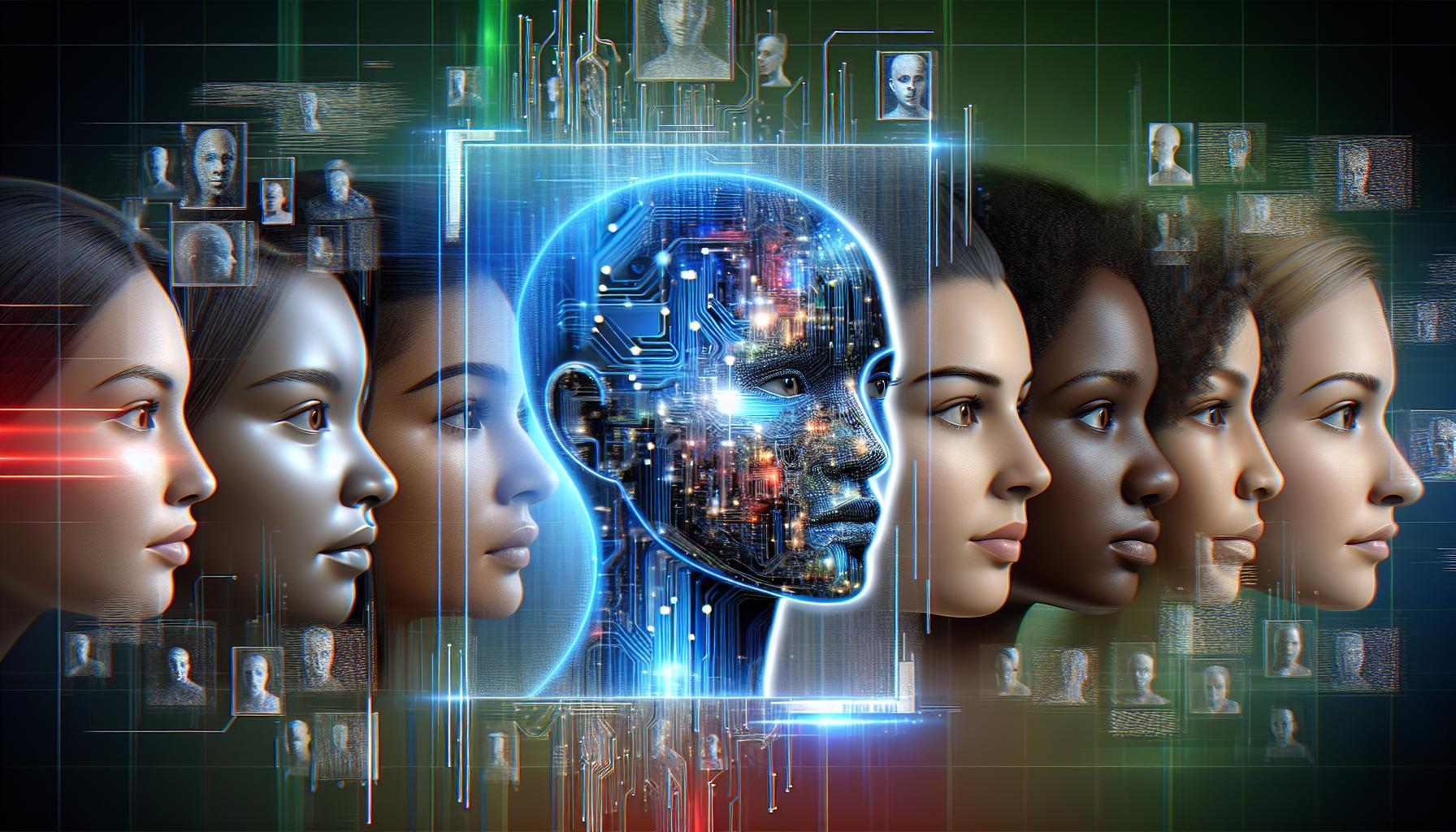As artificial intelligence rapidly evolves, many wonder how these advancements align with biblical teachings. Exploring faith perspectives on technology is crucial, as it allows believers to navigate ethical dilemmas and embrace innovation while staying true to spiritual values. This article examines the intersection of Scripture and AI, revealing insights on technology’s role in our lives.
Understanding Artificial Intelligence: A Primer for Faith Communities

As technological advancements continue to penetrate every facet of our lives, artificial intelligence (AI) stands out as a pivotal innovation that merits thoughtful consideration, especially within faith communities. Understanding AI requires an exploration of its definitions, applications, and implications for humanity. By engaging with this technology from a faith perspective, communities can not only discern its ethical dimensions but also align their technological engagements with spiritual values.
AI refers to computer systems capable of performing tasks that traditionally require human intelligence. This encompasses functions such as recognizing speech, making decisions, and identifying patterns. The ability of AI to learn from data and improve over time brings both opportunities and ethical challenges. For instance, faith communities can utilize AI for enhancing outreach programs, optimizing resource management, or even providing personalized spiritual guidance through chatbots or virtual assistants. However, these benefits come with the responsibility to ensure that the technology is employed ethically and compassionately.
Key Considerations for Faith Communities
When navigating the complexities of AI, faith communities should consider several key principles:
- Ethical Engagement: Examine the implications of AI decisions. How do they align with core spiritual values, such as love, justice, and compassion?
- Human Dignity: Emphasize the importance of maintaining human oversight in AI applications to ensure that these technologies serve rather than replace human connections.
- Education and Awareness: Foster discussions on AI within congregations. Providing educational resources can empower members to engage thoughtfully with technology.
- Collaboration: Work together with tech professionals to create systems that align with ethical guidelines, reflecting the core values of their faith.
One intriguing aspect worth exploring is how different faith traditions perceive technology’s relationship with humanity. For example, while some may view AI as a tool for good, fostering advancements in health and education, others might warn against the potential for dehumanization or misuse of power. Engaging in dialogue around these perspectives can help communities draw insights from their religious texts, like examining if the Bible offers any wisdom on the ethical use of knowledge or innovation, as discussed in the article ‘Does the Bible Say Anything About AI: Faith Perspectives on Technology.’
By establishing a foundation of understanding around AI, faith communities can better position themselves to navigate the opportunities and challenges posed by this revolutionary technology. Embracing this task thoughtfully ensures that they harness AI’s potential while remaining grounded in their ethical and spiritual commitments.
Biblical Principles on Human Creativity and Innovation

The narrative of human creativity is woven deeply into the fabric of biblical teachings. Just as the act of creation is central to the divine identity in the Scriptures, humans are depicted as co-creators, imitating God through their innovation and problem-solving. This connection highlights the intrinsic value of creativity as both a gift and a responsibility that accompanies the divine image in which humans are made.
Understanding Creativity and Innovation through Scripture
The Bible contains several foundational principles that illuminate how creativity and innovation are perceived through a faith lens. Some of these principles include:
- Imago Dei: The concept that humans are created in the image of God (Genesis 1:27) implies that inherent in our nature is the capacity for creativity. This divine likeness is a powerful endorsement for pursuing imaginative solutions and innovative ideas.
- Stewardship: In Genesis 2:15, humans are called to “tend and keep” the earth, pointing toward a proactive role in cultivating the world. This stewardship extends to harnessing technology and innovation to address challenges faced in society.
- Wisdom and Knowledge: Proverbs 2:6 states that “the Lord gives wisdom; from his mouth come knowledge and understanding.” This suggests that creativity should be pursued with a mindset that seeks divine guidance, combining faith with intellectual rigor.
Real-World Applications of Biblical Creativity
The spirit of innovation aligned with biblical principles can manifest in various fields. For instance, consider the burgeoning field of technology influenced by ethical considerations grounded in faith perspectives. Many Christian innovators seek to create technology that not only advances capabilities but also enhances human dignity and fosters community well-being.
Here’s how these biblical principles can translate into actionable steps:
| Actionable Steps | Description |
|---|---|
| Reflect on Divine Purpose | Before embarking on any innovative project, spend time in prayer and reflection to discern the alignment of your goals with God’s purpose for creation. |
| Seek Collaboration | Engage with others in your community, combining diverse talents and perspectives to innovate solutions that reflect stewards of God’s creation. |
| Incorporate Ethical Guidelines | Ensure that the products or technologies created are not only beneficial but also uphold ethical standards that protect and respect human integrity. |
In conclusion, the intersection of biblical teachings and human creativity offers a profound framework for engaging with the world of technology, including artificial intelligence. Through a faith lens, every act of invention and every solution crafted can be seen as embracing the creativity bestowed upon humanity by God, ultimately leading to a more harmonious existence that reflects His divine intentions.
The Impact of Technology on Human Relationships: A Faith-Based Perspective
In an age where digital communication often overshadows face-to-face interactions, many individuals are left pondering how technology reshapes human relationships. The speed of communication through texts, social media, and virtual meetings has created new avenues for connection but also raised concerns about superficiality and loss of emotional depth. A faith-based perspective offers critical insights into navigating these complexities, reminding us that our relationships should be grounded in love, empathy, and authenticity, values echoed throughout biblical teachings.
Embracing Connection in a Digital World
The Bible acknowledges the importance of community and connection. In Hebrews 10:24-25, believers are encouraged not to neglect meeting together but to stimulate one another toward love and good deeds. In today’s digital landscape, technology can be leveraged to foster these connections rather than diminish them. Here are a few ways to do this:
- Virtual Gatherings: Utilize platforms like Zoom or Skype to host Bible study sessions or prayer meetings, enabling fellowship that transcends geographical barriers.
- Social Media Positivity: Engage actively on social media by sharing uplifting messages, scriptures, and supporting others through their struggles.
- Online Community Groups: Join or create online forums focused on shared interests or faith-based topics, helping to nurture deeper discussions and relationships.
By making intentional use of these tools, we can foster communities that reflect the biblical call to love and support one another.
Challenges and Considerations
However, the impact of technology is not without its pitfalls. Distraction, comparison, and the rise of superficial interactions can lead to feelings of isolation despite being “connected.” In Philippians 4:8, we are reminded to focus on things that are admirable and praiseworthy, which can guide our digital interactions. To engage meaningfully in our relationships, consider these strategies:
- Set Boundaries: Designate specific times for technology use, ensuring you prioritize in-person interactions over digital ones.
- Practice Mindfulness: Be present in conversations, listening actively and engaging deeply, rather than being distracted by devices.
- Encourage Vulnerability: Create spaces where individuals can share authentically, whether in person or online, building trust and deeper bonds.
These practices echo the essence of the Christian faith, emphasizing love and understanding, even in a technologically-driven society.
The Role of AI in Relationships
As we begin to incorporate Artificial Intelligence into various dimensions of our lives, questions arise about its influence on personal connections. While AI can facilitate connections through personalized recommendations and virtual assistants, it also presents ethical dilemmas that challenge our understanding of companionship. It’s vital to consider how these tools align with biblical teachings about relationships and morality.
Here’s a simple comparison of potential benefits and challenges posed by AI in relationships:
| Benefits of AI | Challenges of AI |
|---|---|
| Enhanced communication tools | Risk of emotional detachment |
| Accessibility to online support groups | Privacy concerns and data misuse |
| Efficient scheduling for gatherings | Over-reliance may diminish personal initiative |
Utilizing such technologies thoughtfully, always aligning them with faith principles, can help preserve the depth and authenticity of our relationships. Does the Bible say anything about AI? While it may not address AI explicitly, its teachings can guide believers in approaching technological advancements with wisdom and discernment.
Ethical Considerations: What Scripture Says About Moral Responsibility in Tech

In an age defined by rapid technological advancement, one might wonder how ancient scriptures can provide guidance on moral responsibility, particularly concerning emerging technologies like Artificial Intelligence (AI). The Bible offers profound insights into ethical considerations that remain relevant in today’s context, urging creators, developers, and users to introspect on how their technological creations can impact humanity. As we explore these teachings, we uncover themes that emphasize stewardship, integrity, and compassion—principles that can guide us in fostering technology that benefits rather than harms.
Stewardship and Responsibility
The biblical notion of stewardship is a foundational concept that urges individuals to care for creation responsibly. This principle can be explicitly linked to technological development, where creators are stewards of the tools and systems they build. Genesis 2:15 states, “The Lord God took the man and put him in the Garden of Eden to work it and take care of it,” highlighting our responsibility to nurture and protect. In the context of AI, this raises critical questions: Are developers mindful of the ethical implications of their products? Are they considering potential harms, such as bias in algorithms, privacy infringements, and the impact on employment?
Integrity in Innovation
Integrity is another core value emphasized throughout Scripture. Proverbs 11:3 reminds us that “the integrity of the upright guides them, but the crookedness of the treacherous destroys them.” This verse underscores the importance of creating technologies that align with ethical standards and truths. In practice, this might involve setting up regulatory frameworks or ethical boards to evaluate AI systems continuously. Developers are encouraged to adopt transparent practices, ensuring that AI and other technologies promote justice and equality for all users.
Compassion and Community
Compassion is a significant theme found in biblical teachings, directing attention to the well-being of others. Jesus’ teaching in Matthew 22:39—”You shall love your neighbor as yourself”—challenges us to prioritize the impact of technology on individuals and communities. It calls for developers and businesses to consider how their innovations can uplift rather than exploit. For instance, integrating AI in healthcare should focus on enhancing patient care and accessibility, reflecting our moral duty to serve the vulnerable.
Ultimately, as we assess our moral responsibility in designing and implementing technologies, we must draw inspiration from these timeless principles found in Scripture. By fostering an ethical framework rooted in stewardship, integrity, and compassion, we can navigate the complex landscape of modern technology while ensuring that our innovations align with a higher moral calling in the spirit of the insights from “Does the Bible Say Anything About AI: Faith Perspectives on Technology.”
AI and the Concept of Stewardship: Caring for Creation in a Digital Age

In an era where artificial intelligence is rapidly transforming our society, the intersection of technology and spirituality offers rich ground for exploration. The biblical concept of stewardship—not merely as caretaking but as a call to responsible management and nurturing—resonates powerfully in the context of AI. As we harness the capabilities of AI to address pressing global issues, we must reflect on our role as stewards of this technology. Can it lead us toward a more ethical and compassionate world, or will it exacerbate existing inequalities and challenges?
Stewardship in the Age of AI
Stewardship involves a deep sense of responsibility for the world around us, encompassing both physical creation and the technological advancements we pursue. The Bible emphasizes caring for creation as a divine calling. This idea can be translated into our relationship with AI and technology through several key principles:
- Responsibility: Just as we are accountable for the earth, we must also consider our obligation to use AI responsibly, ensuring that it serves humanity’s best interests.
- Community and Collaboration: Effective stewardship involves cooperation—AI should be developed and utilized in ways that promote community well-being and bridge social divides.
- Ethical Innovation: The moral implications of AI decisions should inspire dialogue guided by ethical frameworks rooted in biblical teachings, from the inherent dignity of all individuals to the call for justice and mercy.
Practical Applications of Stewards’ Values
Embedding stewardship values within AI development requires intentional action. Here are several practical steps to embody these principles:
| Action Step | Description |
|---|---|
| Engage Diverse Voices | Invite input from various communities to ensure technology serves a wide range of needs, reflecting the mosaic of human experience. |
| Foster Ethical AI Training | Educators and practitioners should advocate for courses that merge ethics with AI technology, focusing on implications for society. |
| Build Transparency | Design AI systems that are clear about their operations and decision-making processes to build trust and accountability. |
By considering these strategies, we can ensure that the advancements we make in AI are not at odds with our faith principles. Instead, they can serve as tools for nurturing a society that mirrors the values found in scripture, where compassion, justice, and stewardship are paramount. As technology continues to evolve, so does the opportunity to align it with our shared moral framework, potentially transforming our future into a more equitable and caring landscape.
Navigating Fear and Hope: Faith Responses to the Rise of AI

As artificial intelligence continues to penetrate various aspects of life, it ignites both trepidation and optimism among different communities. Many individuals grapple with the implications of this technology on ethics, jobs, and even human identity. In examining faith responses to the rise of AI, we discover a rich spectrum of perspectives grounded in spiritual teachings, offering a compelling narrative shaped by both tradition and contemporary application.
Understanding the Duality of Fear and Hope
In exploring whether the Bible says anything about AI, it’s crucial to recognize that the scriptures often reflect the ambivalence surrounding technological progress. Many believers experience fear about losing the essence of what it means to be human, echoing biblical sentiments about stewardship and creation. Conversely, there’s also a powerful thread of hope that suggests technology can be harnessed for good, aligning with the Biblical call to spread love and aid those in need.
This duality can be seen through various themes:
- Moral Responsibility: The Kingdom of God emphasizes ethics and morality. Believers are called to engage with AI responsibly, ensuring that advancements honor human dignity.
- Hope in Innovation: Just as God has equipped humanity with tools for innovation throughout history, AI can be seen as another opportunity to do good—addressing global challenges like poverty, healthcare, and education.
- Community and Connection: Technology can foster community between believers and non-believers alike, opening new avenues for sharing faith and compassion.
Faith as a Guiding Light in Technology Adoption
Many faith communities are beginning to address the complex challenges AI presents. For instance, ethical frameworks influenced by scriptural teachings are being developed to guide decisions about AI applications in business and medicine. Organizations are encouraged to cultivate an attitude of discernment, ensuring that advancements occur within the parameters of compassion and justice.
| Area of Concern | Faith Perspective | Actionable Steps |
|---|---|---|
| Job Displacement | The Bible advocates for care and support for the marginalized. | Engage in community support programs for retraining workers. |
| Ethical AI Use | Scripture emphasizes truth and integrity. | Implement ethical guidelines in AI development. |
| Identity and Personhood | Human life is sacred as per biblical teachings. | Educate on distinguishing between AI and human contribution. |
Through these lenses, it becomes clear that faith can serve as both a shield against the fears surrounding AI and a beacon of hope for utilizing technology in ways that align with spiritual values. As believers navigate these challenges, they are reminded to remain anchored in their convictions, ensuring that the advancements they embrace are geared toward enhancing, rather than detracting from, the human experience. The question of whether the Bible says anything about AI is not merely academic; it’s an active part of the dialogue as communities explore technology’s role in fulfilling their faith-based missions.
The Role of Wisdom in Integrating AI into Daily Life
In a world increasingly driven by technology, integrating artificial intelligence into daily life is not just a matter of convenience; it speaks to a deeper understanding of wisdom and discernment. As humanity stands on the precipice of an AI revolution, it becomes essential to ponder the ethical and moral implications of these innovations. This reflection aligns with insights drawn from faith perspectives, such as those explored in Does the Bible Say Anything About AI: Faith Perspectives on Technology. The concept of wisdom, deeply rooted in biblical teachings, serves as a guiding principle for navigating the complexities introduced by AI.
The Intersection of Wisdom and Technology
Wisdom, as presented in scripture, is not merely knowledge, but the application of understanding in practical, everyday situations. This principle can be harnessed to make informed choices about how we utilize AI technologies. For instance, businesses can leverage AI for data analysis while ensuring that their decisions remain anchored in ethical considerations, preventing the potential misuse of information. The idea is to harness technological advancements without compromising core values, thus allowing AI to enhance productivity while adhering to ethical standards.
- Seek counsel: Before adopting new technologies, consult with trusted advisors or mentors who possess a thorough understanding of both AI and ethical practices.
- Evaluate impact: Assess how AI integration affects all stakeholders. Consider the wider societal implications, especially concerning privacy and equity.
- Stay informed: Keeping abreast of legislative changes and advancements in AI development can provide a framework for understanding the evolving landscape.
Embracing Wisdom in AI Decision-Making
As we incorporate AI into various facets of life—from personal use to large-scale corporate strategies—applying wisdom can manifest in numerous practical ways. For example, organizations can adopt AI tools like predictive analytics to improve operational efficiency while ensuring that the insights generated are used responsibly. By doing so, they align their practices with the foundational teachings emphasized in Does the Bible Say Anything About AI: Faith Perspectives on Technology, which advocate for a balance between technological advancement and our moral imperatives.
Furthermore, fostering environments that encourage ethical discourse about AI can empower individuals to voice concerns and suggestions. This collective wisdom can lead to better governance around AI applications, ensuring that they serve humanity rather than undermine it.
| Action Steps | Description |
|---|---|
| Implement Ethical Guidelines | Create a framework that defines acceptable uses of AI within your organization. |
| Promote Transparency | Ensure users understand how AI processes their information. |
| Encourage Community Input | Involve diverse community voices in discussions about AI implementation. |
By prioritizing wisdom in the relationship between AI and daily life, we are equipped to not only leverage technology for our benefit but also to uphold the values that define our humanity. This conscientious approach can illuminate a path forward as we consider the implications of AI, reflecting the deeper principles discussed in Does the Bible Say Anything About AI: Faith Perspectives on Technology. Ultimately, it is through wise integration that we can ensure that advancements serve to enhance human dignity and purpose in society.
Faith Leaders and Technology: Building Bridges Between Belief and Innovation
In today’s digital age, where artificial intelligence (AI) and emerging technologies are becoming increasingly integrated into daily life, the intersection of faith and innovation is more crucial than ever. Faith leaders are not only navigating this complex landscape but are also playing a key role in shaping the dialogue around technology’s impact on humanity. They are uniquely positioned to foster a better understanding of how these advancements can align with spiritual teachings, leading to a more harmonious relationship between belief systems and technological innovation.
Embracing Technology as a Tool for Good
Faith communities are recognizing the importance of utilizing technology effectively and ethically. Many leaders advocate for viewing AI not as a threat but rather as a tool that can enhance spiritual practices and community outreach. Examples of this include:
- Online Worship Services: During the pandemic, many churches implemented live-streaming and virtual gatherings, allowing congregations to maintain connections and continue their worship from home.
- AI in Philanthropy: Organizations are using AI-driven analytics to identify needs within their communities and deploy resources efficiently, ensuring that aid reaches those who require it the most.
- Digital Discipleship: Faith leaders are leveraging apps and social media platforms to reach younger audiences, fostering a new kind of engagement that emphasizes interactive learning and community support.
Guiding Ethical Considerations in AI Development
As faith leaders engage with technology, they often emphasize the importance of ethical frameworks that align with their spiritual teachings. The discussions sparked by questions akin to “Does the Bible Say Anything About AI: Faith Perspectives on Technology” serve as a foundation for establishing guidelines that prioritize human dignity, justice, and compassion within AI development.
Consider the following aspects for fostering responsible technology use in faith communities:
| Ethical Principle | Description |
|---|---|
| Dignity: | Encourage technology design that respects and uplifts the inherent value of every individual. |
| Justice: | Promote equitable access to technology, ensuring that marginalized communities are not left behind. |
| Compassion: | Foster algorithms and systems that promote well-being, empathy, and humane responses in interactions. |
In this ever-evolving digital landscape, faith leaders are integral to bridging the gap between belief and innovation. By actively participating in discussions about technology’s role in society, they help to ensure that advancements align with spiritual principles, serving as catalysts for positive change and encouraging their communities to embrace the possibilities that lie ahead.
Faq
Does the Bible Say Anything About AI: Faith Perspectives on Technology?
The Bible does not explicitly mention artificial intelligence (AI), but its teachings can offer insights into the ethics and implications of technology. It encourages believers to consider the moral and societal impacts of innovations.
Many verses emphasize the importance of wisdom, stewardship, and ethical living. While the Bible may not address AI directly, the principles of love, justice, and responsibility can guide our interactions with this technology. For more insights, check our article on technology and faith perspectives.
What are Christian perspectives on technology and AI?
Christian perspectives on technology, including AI, vary widely. Many see it as a tool that can be used for good or bad, depending on how it aligns with Biblical teachings.
For instance, some believe that AI can contribute positively to advancing health care or enhancing communication. Others may express concerns about ethical dilemmas, such as job displacement or privacy issues, urging a careful examination of AI’s role in society.
How can the Bible guide us in using AI responsibly?
The Bible provides principles that can guide responsible AI use, focusing on ethics, love, and community well-being. By emphasizing stewardship and careful discernment, believers can navigate technological advancements.
Scripture advocates for using resources wisely and considering the impact on others. This encourages thoughtful discussions on how AI can reflect our values and priorities in society.
Why does the Bible emphasize wisdom when discussing technology?
The Bible emphasizes wisdom to encourage informed decision-making in technology use. Wisdom is essential for understanding how our actions affect our lives and communities.
In a world increasingly influenced by AI, Biblical wisdom can help navigate complex moral landscapes, ensuring that technology serves humanity positively and ethically, rather than detracting from it.
Can I find examples of technology in the Bible?
Yes, the Bible contains various references to technology-like advancements, such as the construction of the Ark and the Tower of Babel. These stories exemplify human creativity and innovation.
These examples highlight the importance of using technology for good and serving a higher purpose. They remind us to consider how our creation acts, like AI, align with moral objectives and community benefits.
What does the Bible say about the role of humans in creating technology?
The Bible suggests that humans are entrusted with creativity and responsibility in creating technology. This reflects the divine image and encourages constructive innovation.
Genesis underscores humanity’s role in stewardship, urging careful consideration of the technological creations we pursue. Ethical discernment should accompany any advancements, ensuring they uplift and fulfill a greater good.
How can I engage my faith with emerging technologies like AI?
Engaging faith with emerging technologies involves reflection, prayer, and discussion within communities. Actively considering the ethical implications of technology is essential.
Believers can explore ways that technology, such as AI, aligns with their faith values, promoting love and justice. Participation in community dialogues can also deepen understanding and responsible usage of innovations.
The Way Forward
As we conclude our exploration of the intersection between biblical teachings and artificial intelligence, it’s evident that the conversation is as nuanced as it is necessary. We’ve unpacked the foundational principles of stewardship, creativity, and ethical considerations as laid out in scripture, encouraging a reflective approach to technology. The Bible may not explicitly mention AI, but its teachings pave the way for us to engage with cutting-edge advancements in a thoughtful manner.
We invite you to delve deeper into this dialogue, considering how your faith informs your perspective on technology and innovation. Whether you’re a tech enthusiast, a theologian, or simply curious, the ongoing conversation about AI’s role in our lives is ripe for exploration.
Continue to reflect on these themes, engage with your community, and seek out resources that deepen your understanding of both faith and technology. Together, let’s navigate this evolving landscape, ensuring that our approach to AI aligns with our values and aspirations.





